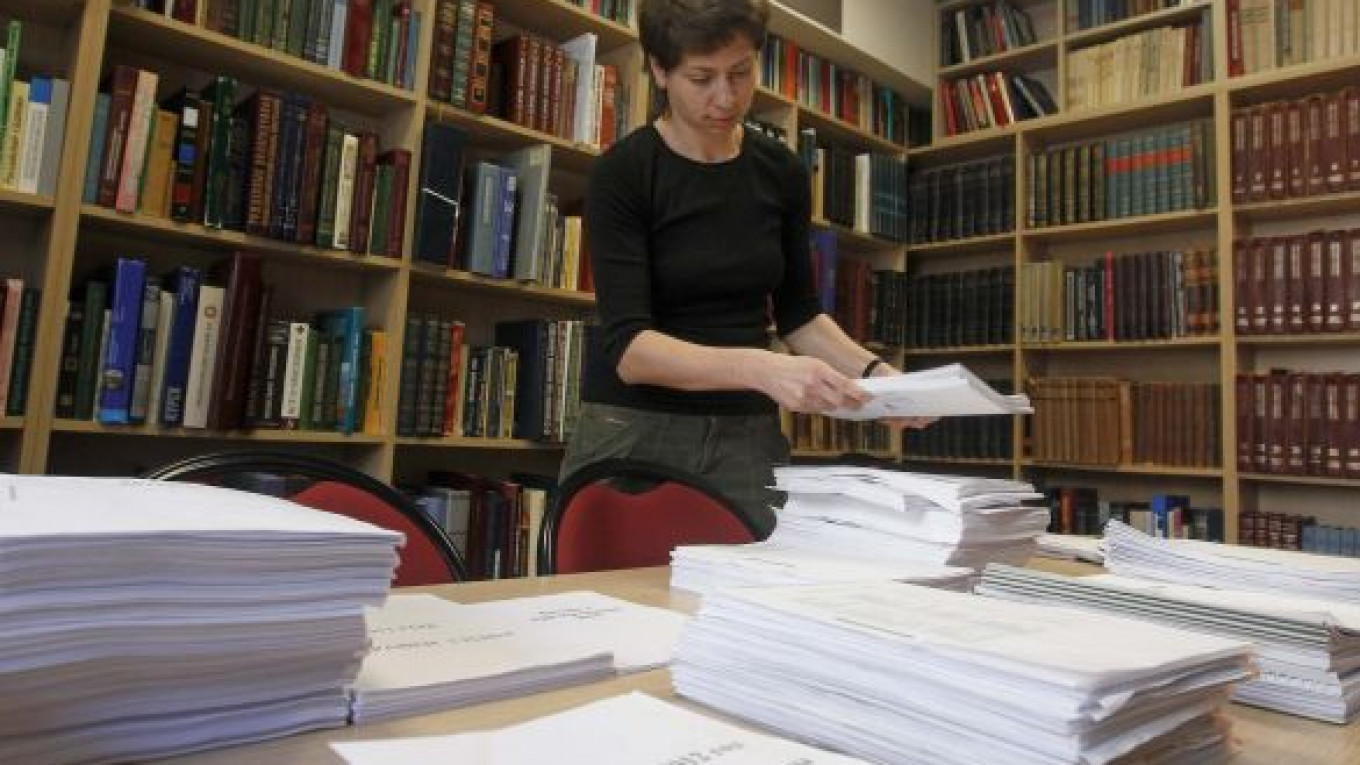The Moscow Helsinki Group, Russia's oldest human rights organization, on Thursday became the latest NGO inspected in a massive government campaign that has hit hundreds of non-state groups in 25 regions and is unprecedented in post-Soviet Russia, a rights leader said.
Prosecutors and Justice Ministry officials on Thursday showed up at the headquarters of the Moscow Helsinki Group, where they asked the organization's veteran leader, 85-year-old Lyudmila Alexeyeva, to turn over internal documents.
"They've inspected everybody else, and now they've come to us," she told Interfax.
One has to go back to the Great Terror of 1937-38, when Soviet dictator Josef Stalin closed all foreign organizations, to find a historical analogy to the current situation, presidential human rights councilman Sergei Krivenko said at a news conference on Thursday.
Leading Russian and foreign NGOs, including Human Rights Watch, and Transparency International and Memorial have been among those inspected, raising fears of a crackdown. Officials have accused some NGOs that criticize the government of being foreign-backed puppets.
President Vladimir Putin said the searches would check whether NGOs were following the law and, in an apparent nod to critics' concerns, asked human rights ombudsman Vladimir Lukin to keep the process under control. "We wouldn't want any excesses," he said, Interfax reported.
The month-old operation has also attracted international condemnation and threatened to strain relations with Germany, France and the United States, some of whose NGOs have been searched.
"Damage to German-Russian relations has already been done. Germany was very irritated by the inspections at two German NGOs," said Jens Siegert, head of the Moscow office of the Boell foundation, a German NGO for civil society development.
Chancellor Angela Merkel plans to discuss the issue with Putin next month during his visit to the Hannover Messe industrial fair, said Ruprecht Polenz, foreign affairs committee head in Germany's lower house of parliament, Die Welt reported.
The U.S. and French governments have both asked for an explanation for the searches.
A senior Russian diplomat said the checks were legal and rejected international criticism.
"Unfortunately, this criticism is completely unfounded. We haven't heard any serious arguments from our colleagues," said Konstantin Dolgov, the Foreign Ministry's commissioner for human rights, Interfax reported Thursday.
A wide array of NGOs, from women's rights groups to environmental advocates to Roman Catholic parishes, have seen their premises searched by various agencies since the beginning of the month.
The inspections are "artillery preparation" before the government moves to enforce a controversial law that requires certain NGOs that receive foreign financing to register as "foreign agents," said Pavel Chikov, head of the Agora human rights group and a presidential human rights councilman.
NGOs have boycotted, and not a single one has registered under the foreign agents law, which went into effect in November, Chikov told journalists in response to a question from The Moscow Times.
Memorial, for instance, will not refuse "prestigious" foreign grants in the future, Krivenko said. "Our parents taught us not to lie, and so we refuse to call ourselves 'foreign agents,'" he said.
Russian NGOs received about 19 billion rubles ($613 million) in foreign funds in 2011, Chikov said.
The Prosecutor General's Office, which has been tight-lipped about the searches, offered vague clues as to government's objectives on Thursday, saying in a statement that the operation would allow officials to establish "positive and negative tendencies" and analyze current NGO laws.
Inspectors have reportedly searched for signs of illegal "extremism" and financing with particular zeal, and the prosecutors' statement referred to ultranational and radical religious groups operating under different names. It did not mention foreign agents, whose outing is the goal of the searches, the said Monday.
But if inspectors were after extremism, "Why are they often joined by tax, fire and other inspectors?" said Mikhail Fedotov, head of the presidential human rights council.
One group received a citation because it did not have a plan for fighting rats, "a serious oversight, of course, but it has nothing to do with extremism, unless you're suggesting that the rats are being used to deliver biological weapons," Fedotov said.
Prosecutors have not yet responded to a written request for additional clarification from the human rights council as required to do so by presidential writ, Chikov said, adding that the council hoped to receive a reply by late April, when he said the checks were scheduled to wrap up.
Contact the author at j.earle@imedia.ru and e.kravtsova@imedia.ru
Related articles:
A Message from The Moscow Times:
Dear readers,
We are facing unprecedented challenges. Russia's Prosecutor General's Office has designated The Moscow Times as an "undesirable" organization, criminalizing our work and putting our staff at risk of prosecution. This follows our earlier unjust labeling as a "foreign agent."
These actions are direct attempts to silence independent journalism in Russia. The authorities claim our work "discredits the decisions of the Russian leadership." We see things differently: we strive to provide accurate, unbiased reporting on Russia.
We, the journalists of The Moscow Times, refuse to be silenced. But to continue our work, we need your help.
Your support, no matter how small, makes a world of difference. If you can, please support us monthly starting from just $2. It's quick to set up, and every contribution makes a significant impact.
By supporting The Moscow Times, you're defending open, independent journalism in the face of repression. Thank you for standing with us.
Remind me later.


